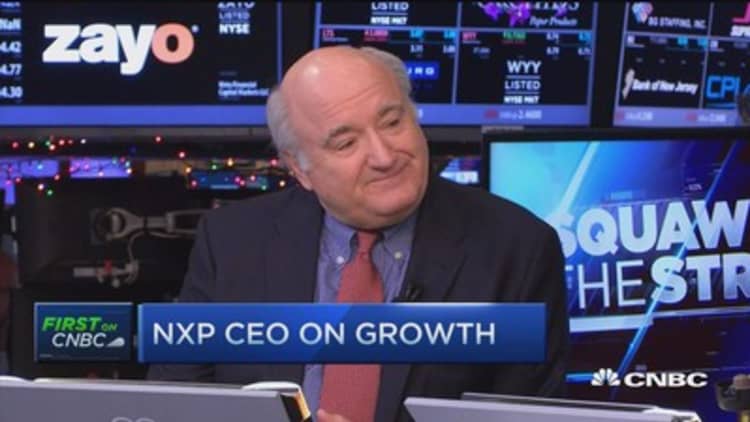
NXP has closed its nearly $12 billion deal to acquire Freescale, doubling the proportion of auto-related revenue to 40 percent to create the world's top maker of automotive electronics, the company said on Monday.
Automotive unit Chief Executive Kurt Sievers said in an interview that the deal would allow NXP to assemble a range of discreet automotive applications into more complete systems running on top of Freescale processors.
It propels NXP into new application areas in cars including powertrain, safety and body electronics, Sievers said, building on its existing leading positions in audio infotainment, security and vehicle networks. It aims to build security into key car systems to guard against hackers.
The merger also bolsters NXP's position in other fast-growing chip markets, including wearable devices and health monitors, for example, while capitalising on the company's strengths in security and payments.
CEO Rick Clemmer said the merger will allow NXP to focus on making driving safer and more convenient.
"The combination of the security platform we had at NXP combined with the computing platform with Freescale puts us in a leadership position," Clemmer told CNBC's "Squawk on the Street." "And then with the combination of the computing and security and connectivity, we think we can drive the connected device market and be the leader in making all of our lives more convenient and safe."
The cash and stock deal, excluding debt, valued Freescale at $11.86 billion, based NXP's closing price on Friday. Freescale shareholders will own about one-third of the combined company.
One new product category NXP expects to develop using Freescale technology is a single integrated radar chip that it is betting will replace current ultrasonic radar systems used in advanced vehicle safety systems, posing a challenge to automotive chip specialist Elmos' existing ultrasonic chips.
This radar chip is an example of what Clemmer said differentiates NXP from the rest of the competition.
"With connected devices, we will connect everything; eventually all of our lives will be connected," Clemmer added. "We want to be sure we make it safe, secure, like the chip on the bank cards today. We want to make life wasier and much more compelling. That's what millennials are looking for."
In order to cater to the millennial demand, Clemmer said it's all about "really being Switzerland and providing the capability to provide the security that the millennials want."
Read More Why NXP Semi's acquisition is a game changer
A second product category will be multimedia processors that can allow NXP to expand its strong position in audio information systems into other areas of infotainment including video display dashboards.
NXP grew out of Dutch consumer electronics giant Philips, co-developer of CDs and DVDs, and also had historic roots in Silicon Valley. Freescale was spun out of cellphone and walkie-talkie pioneer Motorola.
Faltering demand in computer and phone markets, once semiconductor industry mainstays, have fuelled a year-long merger wave as firms look to formerly unloved areas like auto electronics for sales growth.
— CNBC's Ritika Shah contributed to this report

